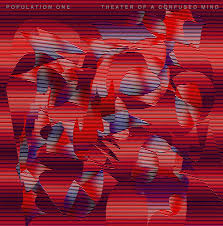When Terrence Dixon delivered a solitary line issuing his retirement from the world of production in April, it heralded the end of a fervent influence on a musical epoch. The statement followed an increased release schedule on Dixon’s own Reduction label throughout 2013, and a Metroplex release earlier this year. It seemed to cyclically align Dixon and the ethos of Population One with the origins of his sonic trajectory–in hindsight, it was the basis of a conclusion.
Dixon’s pursuit of a minimalist project under the alias of Population One was actually reignited by Rush Hour’s inception and inspiration from Dixon’s eponymous track on the Hypnotic Culture EP. It seems fitting that a label directly inspired by his influence releases the potential musical bow of Terrence Dixon. Consider this album an ode within itself, in a dualist sense: from Dixon to Detroit and Rush Hour to Dixon.
This second album under Dixon’s Population One moniker completes the circle initiated by his inaugural release on Claude Young’s Utensil Records in 1994. Unknown Black Shapes represented a brave, disjointed release that, as a mantra, has continued to embody Dixon’s approach as an artist twenty years later. It was an invitation into his interpretation of the art of perfecting a minimalist approach to dance floor functionality – a world of reconceptualising and conflating sparse sonics with an almost scientific methodology; a domination that was theoretically underpinned in a recent, previously unreleased Jeff Mills RBMA lecture. Of course, this may not be entirely applicable to Dixon. Even so, it still presents an insight into the structure of his production.
However, I say this not to reduce or reify the spirit that clearly runs so deep through the Theatre Of A Confused Mind. It is to highlight the complex matrix of meticulous calculation and profound auditory chronicling of Detroit that has manifested itself in an artefact symbolic of both Dixon’s career and the influences that have informed him.
‘Out Of Control’ plays homage to the minimalist pantheon Dixon distinguished. The submerged vocals echo the words ‘Detroit’, in itself signifying an arc towards the fellow minimalist cornerstone – Robert Hood’s guise ‘The Vision’ – with a solitary nod to ‘Detroit: One Circle’, Metroplex and the city. ‘Code Urgent’, on the other hand, delves into a more pulsating melody which is driven along by archetypal high-hats of Detroit techno minimalism.
‘For Only You’, not only in diction but also in mood, directly engages the listener. The engulfing, almost hypnotic double bass tests the power and clarity of the subs but also addresses the individual headspace we find ourselves in on the dance floor, speaking exclusively to you and pricking conscience.
‘Battle For Space’ connotes the afro-futurist foundation to the album that drives the idea of sonically personifying the essence of the city space and its interaction with the individual. ‘Inner City Circus’ builds upon this narrative of mapping the psychogeographic effect of the individual’s experience in the cityscape of Detroit, with the spectre of redundant industry and haunting architecture looming over the production. With the dynamism of the motoring rhythm juxtaposed to a cacophonous arpeggio, it emulates the tumult and the chaos of physically and psychologically negotiating the urban, in the process grounding the title of the album in the tracks’ substance.
A voyeur into the paranoia of the modern is reflected on ‘My Own Shadow’. Rampant industrial noises emanate from under the veil of the avant-garde atmosphere that seems to dominate the direction of this track. If this is the swan song of Terrence Dixon, it represents a closing chapter depicting a body of work with such depth in both context and emotional experience. It immortalises Dixon as a subject to the very muse he is defining, the monolith of inspiration that has shaped 20 years of sonic posturing and will continue to do so. This in essence is just the concluding footnote in Terrence Dixon’s documentation of Detroit.
<div class="fb-comments" data-href="http://thequietus.com/articles/16674-population-one-theatre-of-a-confused-mind-review” data-width="550">


